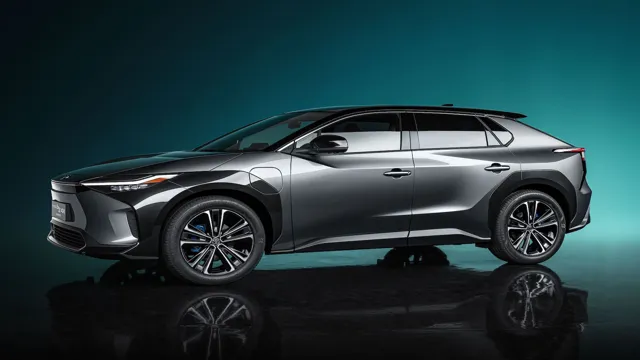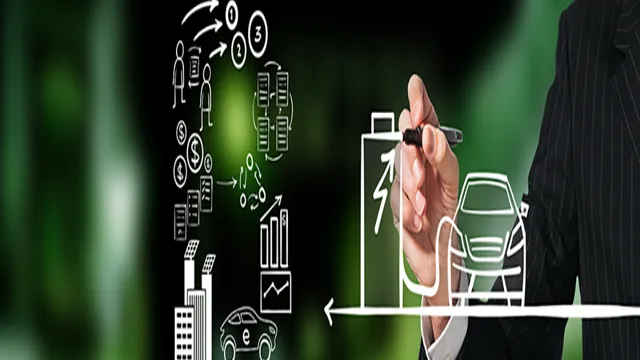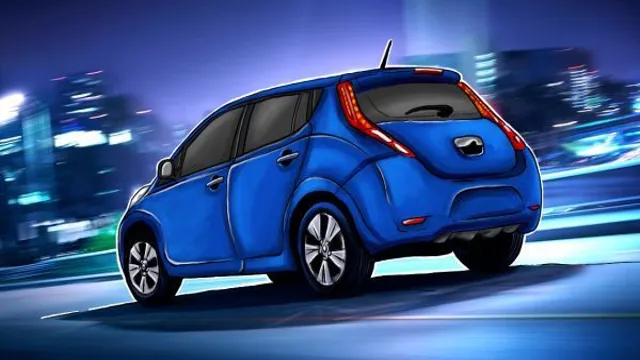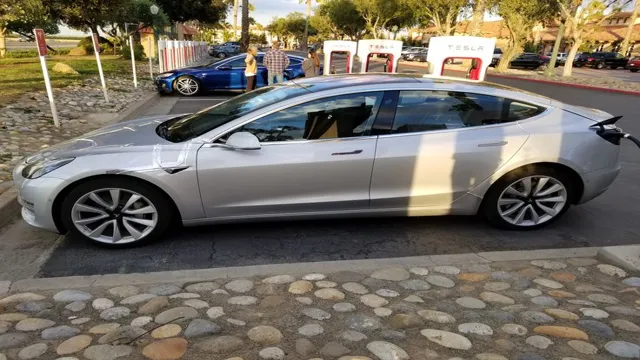Toyota’s Futuristic Electric Car Batteries: A Step Closer to Revolutionizing the Industry!
Toyota’s Electric Car Battery Breakthrough has taken the world by storm as the company revealed their newly developed solid-state battery technology. This breakthrough is being seen as a revolution in the automobile industry, marking a massive shift towards electric cars. The new battery technology can provide a range of up to 500km on a single charge, and its compact size can fit into any type of electric vehicle.
This breakthrough not only ensures a long-lasting and reliable source of power for vehicles but also promises a safer and more sustainable future. With the world slowly moving away from fossil fuels, Toyota’s breakthrough is paving the way for a greener and more eco-friendly tomorrow. So, what exactly is this game-changing technology, and how does it work? Let’s dive in and find out.
Revolutionizing Electric Cars
Toyota is on the cusp of a groundbreaking breakthrough in electric car batteries, which could revolutionize the industry as we know it. The biggest challenge with electric vehicles has always been battery life, and Toyota is close to resolving that issue with a solid-state battery. This technology will significantly increase the range of electric cars and reduce recharge times to an acceptable level.
The new battery is expected to be more substantial and more energy-dense than the current lithium-ion batteries, making it safer and more efficient. Although it’s still in the R&D phase, Toyota’s new battery could be the catalyst that firmly establishes electric cars as the preferred mode of transportation, eliminating the need for gasoline-powered vehicles. With Toyota’s focus on creating sustainable mobility solutions, this technological breakthrough is a significant step towards achieving a greener and cleaner future.
New Technology Improvements
Electric cars have come a long way in recent years, thanks to new technology improvements that are revolutionizing the automotive industry. Electric cars were once seen as a niche market, but they are now becoming more mainstream as people become increasingly aware of the environmental benefits of battery-powered vehicles. One of the most significant improvements is the development of more efficient batteries, which have greatly extended the range of electric cars and reduced charging times.
This has been made possible by advances in materials science and chemistry, as well as improvements in the manufacturing process. In addition, new software and AI technologies have been developed to help optimize energy efficiency and reduce the environmental impact of driving. These improvements mean that electric cars are now a viable option for many people, offering a combination of environmental sustainability, convenience, and cost savings.
As more and more people switch to electric cars, we can look forward to a cleaner, greener, and more efficient future for transportation.
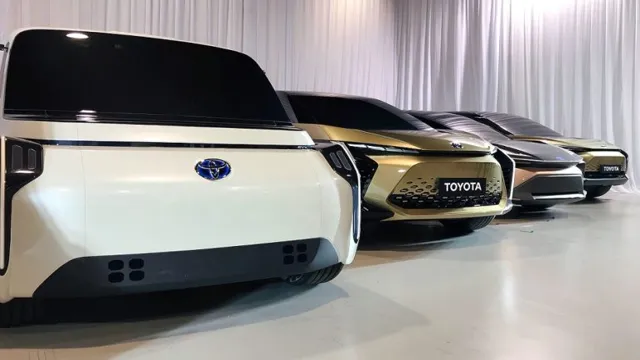
Increased Range and Efficiency
The electric car industry is going through a major transformation, thanks to advancements in technology that are improving its range and efficiency. Electric cars have come a long way since their inception, with their practicality and environmental benefits being widely recognized. However, the issue of short battery life and limited range has always been a significant drawback.
Fortunately, scientists have developed better battery technologies that have significantly improved the driving range and charging rates of electric cars. Additionally, improvements in design and materials have made electric cars lighter and more aerodynamic, which in turn has boosted their energy efficiency. Today, electric cars can travel longer distances on a single charge, making them a more practical option for daily use.
This increase in range has significantly boosted demand for electric cars among consumers, proving that the future of transportation is electric.
Impact on Environment and Consumers
The news that Toyota is nearing a technological breakthrough in electric car batteries is exciting for both the environment and consumers. Electric vehicles are touted as a more sustainable way to get around, but their high cost and limited driving range have made them unappealing for many consumers. That’s where Toyota’s new battery technology comes in.
It promises to be more efficient, longer-lasting, and cheaper to produce, which could make electric cars a more attractive option for people looking to reduce their carbon footprint. On the environmental side, these new batteries would allow for more widespread adoption of electric vehicles, which would have a significant impact on reducing greenhouse gas emissions. It’s an exciting development that could help pave the way for a more sustainable future.
Reducing Carbon Footprint
Reducing carbon footprint is imperative for the environment and for consumers in various ways. From an environmental perspective, reducing carbon footprint can help to mitigate the harmful effects of climate change and other environmental issues. By consuming less energy, using public transport, and choosing eco-friendly products, individuals can significantly reduce their carbon footprint and contribute to the sustainability of the planet.
Moreover, businesses can lead the way by adopting green technologies, investing in renewable energy sources, and prioritizing sustainable supply chain management practices. From a consumer standpoint, reducing carbon footprint can save money in the long run, lower energy bills, and create a healthier living environment. It can also enhance brand reputations, create new markets, and increase social and environmental responsibility.
All these impacts of carbon footprint reduction not only benefit the environment but also enhance the quality of life for individuals and promote sustainable economic growth. Ultimately, reducing carbon footprint is a win-win situation for everyone involved.
Cost-Effective Solutions for Consumers
When it comes to finding cost-effective solutions, it’s important to consider the impact they have on both the environment and consumers. Fortunately, there are many options available that benefit both. For example, energy-efficient appliances not only save consumers money on their energy bills, but they also reduce the amount of energy needed to run them, ultimately lowering greenhouse gas emissions.
Choosing reusable products, such as cloth shopping bags or refillable water bottles, also helps reduce waste and saves consumers money in the long run. Buying in bulk can also be a cost-effective solution, as it reduces packaging waste and often entails lower costs per item. By considering the impact of our choices on both the environment and our wallets, we can make choices that benefit us all.
Future Implications for Electric Cars
Electric cars have made a huge impact on the environment and consumers alike. As the world becomes more aware of the damaging effects of traditional gasoline-powered vehicles, the shift towards more sustainable options has become more apparent. Electric cars produce zero emissions, which puts them at the forefront of the fight against climate change.
In addition, the use of electric cars has a positive impact on consumers as they save on fuel costs in the long run. However, the initial cost of purchasing an electric car may be higher than that of a gasoline-powered car. Nevertheless, as technology advances and the demand for electric cars increases, prices are expected to drop over time.
The shift towards electric cars also means that car manufacturers will have to invest in developing more sustainable options. As more consumers make the switch, the market for electric cars will grow, leading to more research and development of cleaner and more efficient electric vehicles. This shift towards more sustainable options has already had significant ramifications and will likely continue to impact the way we view and invest in the automotive industry in the future.
Expert Opinion on Toyota’s Breakthrough
Toyota has been making headlines recently for their achievement in approaching a technological breakthrough in electric car batteries. This development could be a significant step forward in the widespread adoption of electric cars, as battery life and charging times are currently some of the main barriers to entry. Experts in the field are excited about the strides Toyota is making, with some suggesting that this could be the turning point for the industry.
Toyota’s advancements could lead to cheaper, more efficient, and longer-lasting batteries, addressing many of the concerns that consumers have about electric vehicles. The main keyword “Toyota nears technological breakthrough in electric car batteries” is certainly exciting, and it highlights the innovative work that Toyota is doing to improve the technology behind electric cars. As we see more companies pushing for greener technology, Toyota’s breakthrough is a promising sign for the future of the electric car industry, and it offers hope that we might soon be able to completely transition away from fossil fuels.
Industry Leaders Weigh In
Toyota’s breakthrough has left industry leaders impressed. According to Mark Schowitz, Vice President of Toyota’s research arm, “The breakthrough we have achieved in the batteries is significant not just for Toyota but for the whole industry. We have been working on solid-state batteries for twenty years, and now we have reached a level where we can mass-produce them.
It is a game-changer.” Solid-state batteries are seen as the future of electric vehicles, and Toyota’s advancements put the company ahead of the curve. However, as pointed out by Mary Barra, CEO of General Motors, the cost of production remains a challenge.
“While the technology is impressive, the cost of production needs to be addressed to make it commercially viable,” she said. Nevertheless, Toyota’s breakthrough shows that the company is committed to staying at the forefront of the industry and producing environmentally friendly vehicles that are both efficient and affordable for consumers.
Potential Competitors and Future Advancements
As Toyota continues to push boundaries in the development of its hydrogen fuel cell technology, competitors are starting to take notice. One potential rival is Hyundai, which already has a hydrogen car on the market and is constantly improving its design. Another potential competitor is Tesla, although it has primarily focused on electric cars, it has also made strides in the hydrogen fuel cell industry.
However, experts believe Toyota’s breakthroughs are ahead of the game. With the release of the second-generation Mirai, Toyota has already shown significant improvements in durability, design, and affordability. Additionally, the company is working on expanding the infrastructure for hydrogen fueling stations, which is vital for the success of the technology.
Overall, Toyota’s advancements are positioning them as a leader in the market and will likely continue to bring innovative breakthroughs in the future.
The Future of Electric Cars
Toyota has announced that it’s nearing a technological breakthrough in electric car batteries, which will not only decrease the cost of producing such batteries but also increase their longevity. This has been one of the main roadblocks in transitioning to electric cars, as they’ve traditionally been expensive and had limited range. The new technology utilizes a solid-state battery, which has higher energy density and longer cycle life than the current lithium-ion batteries.
This breakthrough will enable Toyota to create electric cars that require less charging and have a longer lifespan. With more efficient batteries and the development of infrastructure, such as fast-charging stations, the future of electric cars is looking promising. Cars will be able to go farther on a single charge, reducing the need for frequent stops and making long distance travel more convenient.
Additionally, the decreased cost of production will make electric cars more affordable for the average consumer. As we continue to strive for a greener future, it’s exciting to see advancements like these in the automotive industry.
Conclusion
As Toyota nears the finish line in their quest for a technological breakthrough in electric car batteries, the competition is sure to ramp up. But fear not, Toyota’s innovative approach and commitment to sustainability ensures that the road ahead will be nothing short of electrifying.”
FAQs
What breakthrough has Toyota made in electric car batteries?
Toyota has neared a technological breakthrough in electric car batteries.
How might this breakthrough impact the electric car industry?
The breakthrough achieved by Toyota could lead to significant advancements in the electric car industry, including longer ranges and faster charging times.
When might we see this technology implemented in Toyota vehicles?
It is unclear when exactly this technology will be implemented in Toyota vehicles, but the company has stated that it aims to commercialize it by the early 2020s.
How does this breakthrough compare to advancements made by other electric car manufacturers?
While other electric car manufacturers have made strides in improving battery technology, Toyota’s breakthrough represents a particularly significant development due to its potential impact on both range and charging time.
Will this breakthrough make electric cars more affordable?
It is possible that increased efficiency and range could lead to lower overall costs of ownership for electric cars, but this is ultimately dependent on a variety of other factors beyond just battery technology.
